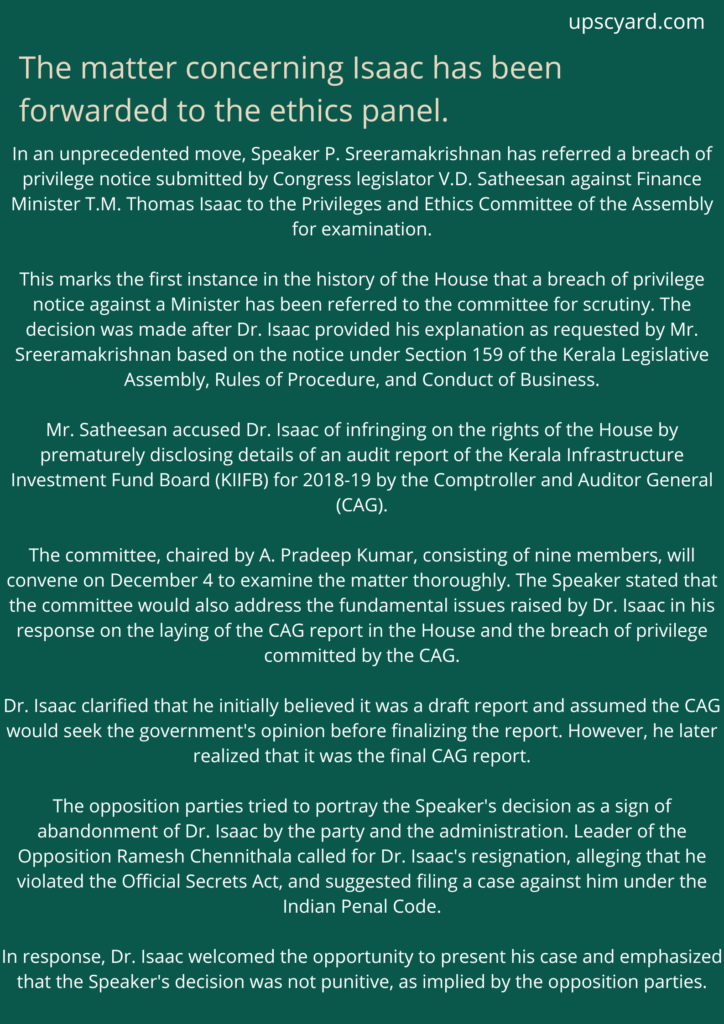Politics and Ethics
Politics and ethics or political ethics refers to making moral judgments to guide action and methods of decision-making for the public good.
- Politics and Ethics are completely separate.
- the South Indian movie “ Jana Gana Mana” has clearly highlighted this issue of how politicians gain power by separating from ethics and playing with public sentiments.
- Ethics is integral to politics
- Aristotle believed that ethics and politics are strongly related. Ethics examines the good of the individual, while politics examines the good of the state, which he considered to be the best type of community.
- the Indian constitution is a prime example of how ethics is integral to politics.
- Politics without ethics is disastrous.
- Russia-Ukraine War, Nupur Sharma Case.
As rightly said by Mahatma Gandhi, politics without principles and ethics would be disastrous.
Ethical values exert a significant influence on public discourse in the realm of politics. While expecting perfection in politics, considering the inherent ethical complexities, may be unrealistic and oversimplified, the standards set in politics can have far-reaching effects on other aspects of governance.
The criminalization of politics is a concerning issue, as individuals with criminal backgrounds actively participate in the electoral process, utilizing financial resources and physical force to secure votes for political parties.
Widespread illegal and illegitimate use of funds during elections serves as another underlying cause of corruption. Addressing this issue by ensuring fair and transparent elections becomes a critical step towards improving political ethics, reducing corruption, and rectifying flawed administrative practices.
Politics and Ethics do not align !
Voltaire’s quote powerfully illustrates the lack of ethical considerations in politics. Ethics encompasses the moral values that influence how individuals conduct themselves in society, organizations, or any endeavor. It plays a pivotal role in establishing the right structure for our social and political interactions to maintain moral standards. Yet, present-day politics seems to fall short of adhering to these principles. Despite this apparent dissonance, it is essential to thoroughly explore the connection between ethics and politics before making hasty conclusions. Taking a nuanced approach will help us better understand the complex dynamics at play.
Can be align
Mahatma Gandhi, whose principles have left a lasting impact on our political landscape, serves as an exemplary illustration of how ethics can thrive in politics. Our constitution also places a high value on ethical governance, which, in turn, influences the political landscape.
While thinkers like Kautilya and Machiavelli might question the direct relevance of ethical norms in politics, they acknowledge the significance of justice and welfare for political continuity, stability, and sustainability. In this way, ethics can unconsciously become intertwined with politics, showcasing that they can coexist harmoniously.
Can’t be align
Kautilya’s perspective encourages the pursuit, retention, and enlargement of political authority without being bound by moral limitations. According to this realistic viewpoint, a just government acts as the most potent shield against external threats, as the citizens will passionately defend a fair and esteemed ruler.
Conclusion
In discussions spanning different traditions, the idea of ethical responsibility in politics remains a consistent topic. We frequently encounter two opposing views – one that sees ethics as a guiding framework for politics and another that disconnects politics entirely from ethical obligations. However, it is vital to acknowledge that no tradition supports systematic cruelty or the justification of impunity from the outset. Although some level of arbitrary rule might be tolerated, it is generally condemned. Thus, ethics inevitably plays a crucial role in politics, imparting it with a humane essence.
Recent advancements have been made.
Several noteworthy developments have taken place, including:
- Enhancements in the accuracy of the electoral roll.
- Implementation of the 91st Amendment Act of 2003, which limits the size of the council of ministers to 15% of the Lok Sabha/State Legislature’s strength.
- Introduction of candidate antecedent disclosure.
- Disqualification of individuals convicted of criminal offenses.
- Strengthening of the Election Commission’s role in enforcing the code of conduct.
- Assurance of free and unbiased polling through the deployment of Central Armed Forces.
Problems concerning political reforms.
Reforming Political Funding: Political parties often rely on private donations as a source of support. Different countries use various methods for state funding of political parties and elections.
The first approach is the minimalist model, where elections receive partial subsidies independently.
Intermediate Models: There are diverse mixed patterns observed in countries like France, the Netherlands, and South Korea. These models involve partial reimbursement for public funding of elections based on a matching grant system.
Election Spending Restrictions: The Representation of the People Act of 1951 imposes limitations on election expenditures. Initially, corporate donations to political parties were prohibited in 1969, but they were later allowed by an amendment to the Companies Act in 1985.
Recommendations by the Dinesh Goswami Committee: In 1990, the Dinesh Goswami Committee on Electoral Reforms proposed several suggestions. These included limited in-kind support for expenses like vehicle fuel, microphone rental fees, and copies of electoral rolls. The committee also suggested a prohibition on corporate donations.
Many countries, including the United Kingdom, Ireland, and Australia, implement this model by providing specific grants or state-provided services to support political parties and elections.
Ethical Framework on minister in India
The Commission has carefully reviewed the codes of conduct implemented in various countries and believes that a comprehensive Code of Ethics and a Code of Conduct for Ministers should encompass the following principles:
- Ministers must uphold the highest ethical standards in their public service.
- Ministers are obliged to adhere to the principle of collective responsibility.
- Ministers are accountable to Parliament for their departments’ policies, decisions, and actions.
- Ministers must avoid any conflict between their public duties and personal interests, or any appearance thereof.
- Ministers representing Lok Sabha constituencies must maintain a clear distinction between their roles as Ministers and constituency members.
- Ministers should comply with the requirements established by both Houses of Parliament.
- Misuse of official position or information constitutes a breach of the trust vested in them as public officials.
- Ministers should act with objectivity, impartiality, honesty, fairness, diligence, and justice.
As for the existing Code of Conduct:
- The responsibility for ensuring compliance with the current Code of Conduct rests with the Prime Minister for Union Ministers, with the Prime Minister and the Union Home Minister for Chief Ministers, and with the relevant Chief Minister for State Government Ministers.
- The Commission recommends the establishment of dedicated units within the offices of the Prime Minister and the Chief Ministers of states to oversee adherence to the Code of Conduct.
In light of these considerations, the Commission proposes the following:
- In addition to the existing Code of Conduct, the introduction of a Code of Ethics to provide clear guidance on how Ministers should maintain the highest standards of constitutional and ethical conduct in their roles.
- These dedicated units in the offices of the Prime Minister and Chief Ministers should also be responsible for monitoring compliance with the Code of Ethics and the Code of Conduct. They should be empowered to receive and address public complaints related to Code of Conduct violations.
- The Prime Minister and Chief Minister, regardless of coalition government dynamics, must ensure that Ministers uphold the Code of Ethics and the Code of Conduct.
- An annual report on the adherence to these codes should be submitted to the respective legislatures, detailing any violations and the corresponding actions taken.
- The Code of Ethics should encompass essential principles regarding the Minister-civil servant relationship, as well as the Code of Conduct.
- These codes and the annual report should be made accessible to the public for transparency and accountability.
Ethical Framework for Legislators
The Rajya Sabha’s Committee on Ethics:
- Chapter XXIV of the Rules of Procedure and Conduct of Business in the Council of States outlines the formation of the Committee on Ethics, responsible for supervising the ethical behavior and conduct of its Members.
Filing Assets and Liabilities Statement:
- A new provision, Section 75A, added through the Representation of the People (Third Amendment) Act, 2002, mandates that every elected candidate for a Parliament or State Legislature must submit details of their assets and liabilities to the Chairman of the Council of State or the Legislative Council within ninety days of taking the oath or affirmation.
Recommendations:
- To enhance ethical oversight, each House of Parliament should establish an ‘Ethics Commissioner’ office. This office, operating under the Speaker/Chairman, would support the Committee on Ethics in its functions, offer advice to Members as needed, and maintain essential records.
For State legislatures, the Commission suggests the following:
- Adoption of a ‘Code of Ethics’ and a ‘Code of Conduct’ for Members, with clear procedures for imposing sanctions in cases of violations, to ensure legislators’ ethical behavior.
- The establishment of ‘Registers of Members’ Interests,’ in which Members of State legislatures declare their interests.
- Publishing Annual Reports detailing, including any ethical violations, to be presented to the respective Houses.
- Creation of an ‘Office of Ethics Commissioner’ in each State legislature, operating under the Speaker/Chairman, following the same model as suggested for the Parliament.
Ethical Framework for Judiciary
In a Full Court Meeting held on May 7, 1997, the Supreme Court of India unanimously adopted the ‘Restatement of Values of Judicial Life,’ commonly referred to as the Code of Conduct for judges. The key provisions include:
- Restrictions on Family Members: No family member who is a practicing lawyer shall use the judge’s residence or facilities for professional work.
- Maintaining Dignity: Judges should maintain a certain level of aloofness in line with the dignity of their office.
- Impartiality: Judges must not preside over cases involving family members, close relations, or friends.
- Political Neutrality: Judges should refrain from expressing their views on political matters or issues pending judicial determination.
- Avoiding Public Debates: Judges are encouraged to let their judgments speak for themselves and should avoid giving media interviews.
- Gifts and Hospitality: Judges should not accept gifts or hospitality, except from family, close relations, and friends.
- Disclosure of Interests: Judges must disclose their interests in cases where companies they hold shares in are involved.
- Prohibition on Speculation: Judges are not permitted to engage in speculative activities involving shares, stocks, or similar investments.
In addition, the report suggests establishing a National Judicial Council with broad representation, responsible for laying down the Code of Conduct for judges at all levels of the judiciary. The Council’s composition would include:
- The Vice-President as Chairperson
- The Prime Minister
- The Speaker of the Lok Sabha
- The Chief Justice of India
- The Law Minister
- The Leader of the Opposition in the Lok Sabha
- The Leader of the Opposition in the Rajya Sabha
Regarding High Court Judges, the Council would also include the Chief Minister of the concerned State and the Chief Justice of the concerned High Court.
The National Judicial Council would have the authority to set the Code of Conduct for judges, oversee their conduct, investigate alleged misconduct, and impose minor penalties. It would also recommend the removal of judges as necessary.
For enforcement of the Code of Conduct, a Judge of the Supreme Court would be designated as the Judicial Values Commissioner, and a similar arrangement would be made for the High Court. These Commissioners would be responsible for ensuring compliance with the Code of Conduct.
The path ahead.
TIGHTENING OF ANTI-DEFECTION LAW
It wields significant influence in promoting political corruption as it involves manipulating the political system for the benefit of private interests.
- The 91st Amendment to the Constitution, passed in 2003, aimed to strengthen the anti-defection provisions outlined in the Tenth Schedule.
- According to this amendment, individuals or groups switching political parties are obligated to resign from their legislative positions.
- If politicians defect and cannot retain their office through a ‘split’ of one-third of the members or by claiming a ‘continuing split of a party,’ they must now face re-election. As a result, defections have become highly unlikely, representing a substantial step towards cleansing the realm of politics.
GROUNDS OF DISQUALIFICATION FOR MEMBERSHIP
Article 102 of the Constitution allows for disqualification from membership in either House of Parliament in certain circumstances, which include the following:
- Holding a profit-making position in the Government of India or any State government, except for positions exempted by Parliament from disqualification by law.
- Being declared mentally ill by a competent court.
- Not being an Indian citizen, voluntarily acquiring the citizenship of another country, or pledging allegiance or adherence to another country.
- Being disqualified under the Tenth Schedule, which pertains to defection.
- Being barred from membership by any law enacted by Parliament. However, such a law has not been passed yet.
DISQUALIFICATION
The listed heinous crimes include murder, abduction, rape, dacoity, waging war against India, organized crime, and narcotics offenses. Additionally, disqualifying individuals accused of corruption seems justifiable if the charges are framed by a judge or magistrate based on prima facie evidence.
To prevent politically motivated cases, the Election Commission has proposed limiting such disqualification to cases filed within six months before an election as a precautionary measure.
FALSE DECLARATIONS
The Election Commission has put forward a proposal to classify all false declarations made before the Returning Officer, Electoral Officer, Chief Electoral Officer, or the Election Commission as an electoral offense under Section 31 of the Representation of the People Act. This measure aims to strengthen the electoral process and deter individuals from providing incorrect information during elections. By treating false declarations as an offense, the Commission aims to uphold the integrity and credibility of the electoral system.
COALITION AND ETHICS
In coalition politics, coalition partners often switch alliances, forming new coalitions driven by opportunism and a desire for power, without adhering to the common minimum program agreed upon during government formation.
To protect the integrity of the people’s mandate, it becomes crucial to establish an ethical framework that prevents opportunistic acts, like reshuffling coalitions between elections, from occurring. This framework would ensure stability and accountability in the political system, respecting the mandate given by the voters.
EXPEDITING DISPOSAL OF ELECTION PETITIONS
In India, election petitions are currently filed in the High Court, with an expectation of resolution within six months, as per the Representation of the People Act.
However, in reality, these petitions often drag on for several years, and during this prolonged period, the term of the House may expire, rendering the election petition ineffective. This delay hampers the timely resolution of election-related disputes and can impact the legitimacy and effectiveness of the electoral process.
MAINS QUESTION | GS4
Q. Is there a Code of Ethics and Code of Conduct specifically established for political representatives? Discover the answer. (Read this first)

Q. Does ethics hold significance in politics? Provide justification with appropriate examples. (200 words)
Ethics in politics revolves around examining the moral nature of voluntary human actions to ascertain their morality.
Excluding ethics from politics may breed a trust gap between citizens and the political system, jeopardizing good governance and effective government.
Compassion, empathy, and selflessness play vital roles in politics, promoting the well-being of citizens. This is evident from the successful land reform in West Bengal, which highlights the significance of these qualities.
Dishonesty and lack of integrity in politics can harm citizens. Leaders who lack honesty may engage in corruption, as witnessed in the fodder scam in Chaibasa and the NRHM scam in Uttar Pradesh.
Honesty and integrity shape the character of a nation, as emphasized in the Shrimad Bhagavad Gita. Politicians should be truthful in their words and deeds, and adhering to the promises made in political manifestos is crucial to maintain a positive reputation.
Transparency and accountability are essential in politics to fulfill the core purpose of governance in a country. Their absence can lead to corruption, as seen in the Sarada chit fund scam. The introduction of e-office in the HRD ministry is a commendable step towards ensuring transparency and accountability.
In summary, ethics plays a crucial role in influencing the path of politics and governance. It entails evaluating the moral dimensions of human actions in the political realm to discern their appropriateness or impropriety. Embracing ethical principles in politics can cultivate a deeper sense of trust and reliability between citizens and the political system, thereby reinforcing the foundations of effective governance and responsible leadership.




